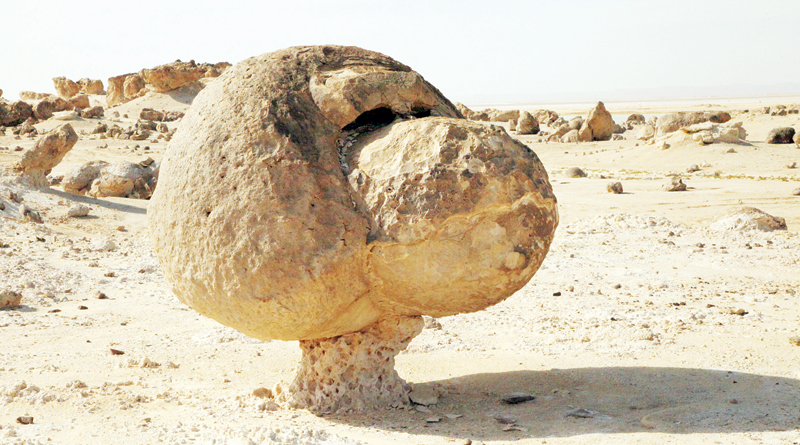

Boasting a narrative that spreads over millions of years, Duqm Rock Garden is undoubtedly one of Oman’s most amazing geo-treasures. It owes its otherworldly charm to nature’s deft finetuning. In fact, the place is in a perennial beauty therapy session with the cosmic elements.
The exquisite rock garden will soon be reinventing itself as a driver of social, cultural, environmental and economic sustainability of the region, with the Ministry of Tourism working on a grand project to redefine this natural wonder as a geological park, and also to significantly boost its geotourism attraction.
Geotourism, a relatively new movement, is defined as a form of tourism that essentially enhances the geographical character of a place that includes its environment, culture, aesthetics, heritage, and the life of locals. The most significant aspect of geotourism is the total involvement of local community, which is expected to act as a partner in offering visitors an enrichingly genuine tourism experience by highlighting native culture, crafts and traditions, along with the place’s geographical uniqueness.
Geotourism aims to protect the locality’s precious resources that could be damaged by traditional tourism. This is achieved by stressing on sustainability at all levels. Overtourism, as such, is a big No. Members of the local community get ample opportunities to offer local services and promote diverse assets. Geotourism encourages meaningful exchange between the locals and foreign visitors.
Geotourism may involve geological and Geomorphological sites, Mining (ancient, abandoned, current) sites, Anthropological (in caves & mines) sites, and Adventure-based sites, among others.
Preserving the magnificence of geosites for future generations is now considered a key aspect of sustainable development. Geotourism and its commercial exploitation are still in its infancy, and establishing geoparks offers a sustainable development model to promote geosites effectively.
Global initiatives such as the European Geoparks Network and the Global Geoparks Network work towards the preservation and popularisation of the region’s geo-heritage through sustainable tourism. Geoparks and geotourism offer immense opportunity for not just locals but students, professionals, and other stakeholders as well to identify and create innovative products, facilities, services and technologies for geoparks.
The Duqm Rock Garden geopark project — named Al Huqf — is a collaborative effort involving the Special Economic Zone Authority of Duqm (SEZAD), and could support the Sultanate’s Tanfeedh programme, aimed at the country’s economic diversification.
Al Huqf is expected to play a key role in establishing the Sultanate as one of the world’s choicest geotourism destination. Promoting local crafts and enhancing the earning potential of local artisans feature among the major objectives of Al Huqf.
Attracting global tourists to the geopark in Duqm wouldn’t be difficult, as Duqm is strategically positioned midway between Muscat and Salalah.
Also, the opening of Al Huqf geopark could greatly help in creating enhanced public awareness about the significance and value of geological sites in the Sultanate, and the need to preserve them and promote them globally, with the active participation of local communities and other stakeholders, especially those in the tourism sector.
Duqm Geopark and its majestic stone formations could, verily, open up multiple communication channels for every visitor to converse with the pristine nature, and know oneself better.
Oman Observer is now on the WhatsApp channel. Click here



